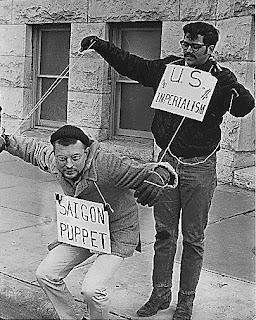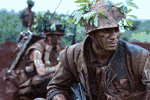Along with the Civil Rights campaigns of the 1960s, one of the most divisive forces in twentieth-century U.S. history. The antiwar movement actually consisted of a number of independent interests, often only vaguely allied and contesting each other on many issues, united only in opposition to the Vietnam War. Attracting members from college campuses, middle-class suburbs, labor unions, and government institutions, the movement gained national prominence in 1965, peaked in 1968, and remained powerful throughout the duration of the conflict. Encompassing political, racial, and cultural spheres, the antiwar movement exposed a deep schism within 1960s American society.
A small, core peace movement had long existed in the United States, largely based in Quaker and Unitarian beliefs, but failed to gain popular currency until the Cold War era. The escalating nuclear arms race of the late 1950s led Norman Cousins, editor of the Saturday Review, along with Clarence Pickett of the American Society of Friends (Quakers), to found the National Committee for a Sane Nuclear Policy (SANE) in 1957. Their most visible member was Dr. Benjamin Spock, who joined in 1962 after becoming disillusioned with President Kennedy's failure to halt nuclear proliferation. A decidedly middle-class organization, SANE represented the latest incarnation of traditional liberal peace activism. Their goal was a reduction in nuclear weapons. Another group, the Student Peace Union (SPU), emerged in 1959 on college campuses across the country. Like SANE, the SPU was more liberal than radical. After the Joseph McCarthyinspired dissolution of Communist and Socialist organizations on campuses in the 1950s, the SPU became the only option remaining for nascent activists. The goal of the SPU went beyond that of SANE. Unwilling to settle for fewer nuclear weapons, the students desired a wholesale restructuring of American society. The SPU, never an effective interest group, faded away in 1964, its banner taken up by a more active assemblage, Students for a Democratic Society (SDS).
The American movement against the Vietnam War was the most successful antiwar movement in U.S. history. During the Johnson administration, it played a significant role in constraining the war and was a major factor in the administration's policy reversal in 1968. During the Nixon years, it hastened U.S. troop withdrawals, continued to restrain the war, fed the deterioration in U.S. troop morale and discipline (which provided additional impetus to U.S. troop withdrawals), and promoted congressional legislation that severed U.S. funds for the war. The movement also fostered aspects of the Watergate scandal, which ultimately played a significant role in ending the war by undermining Nixon's authority in Congress and thus his ability to continue the war. It gave rise to the infamous "Huston Plan"; inspired Daniel Ellsberg, whose release of the Pentagon Papers led to the formation of the Plumbers; and fed the Nixon administration's paranoia about its political enemies, which played a major part in concocting the Watergate break-in itself.
Source:textbook788-808
Vietnam War Wikipedia
http://www.youtube.com/watch?v=Jm3ShX0PMM8
http://www.youtube.com/watch?v=wOdtPFe-BN4
http://www.youtube.com/watch?v=GscXBdorMVY












